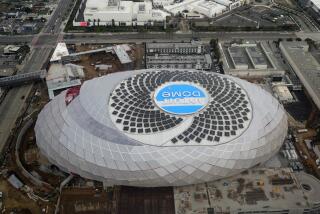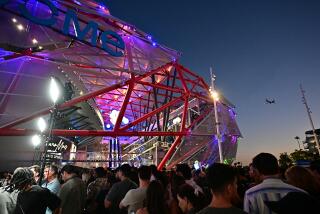At Century City Shopping Center : Dancing, Drinking Curbs OKd
Diners at five new restaurants in the expanded Century City Shopping Center will have to forgo trips to the dance floor, and late-night moviegoers in search of a nightcap will have to settle for non-alcoholic drinks.
The dancing and drinking restrictions, along with 30 others, were approved Tuesday by the Los Angeles Board of Zoning Appeals during a three-hour hearing on the shopping center’s request for 18 liquor permits at its 80,000-square-foot Marketplace expansion.
For the record:
12:00 a.m. Feb. 7, 1988 For the Record
Los Angeles Times Sunday February 7, 1988 Home Edition Westside Part 9 Page 3 Column 1 Zones Desk 2 inches; 49 words Type of Material: Correction
Because of a typographical error, a story in Thursday’s Westside section incorrectly stated the restrictions on serving alcohol at five new restaurants in the Century City Shopping Center. The Los Angeles Board of Zoning Appeals voted to prohibit the sale of alcohol after midnight Sunday through Thursday and after 1 a.m. on Friday and Saturday.
The restrictions prohibit the sale of alcohol in the restaurants after midnight Sunday through Thursday, and after 1 p.m. on Friday and Saturday. At fast-food counters, the cut-off hour is 10 p.m.
The hearing--a tedious negotiating session involving the mall, nearby homeowners and Councilman Zev Yaroslavsky’s office--should help soothe stormy relations between the mall’s operators and residents of Tract 7260, who have been warring over the expansion since last summer.
“It seemed pretty fair to us,” said Irving Hirschfield, a 32-year-resident of the area and a spokesman for Tract No. 7260 Assn., which represents about 600 homeowners southwest of the shopping center. “The more salient elements are satisfying to us.”
Michael Strle, general manager of the shopping center, said he was “generally satisfied” with the compromise, but said the mall may appeal parts of it to the Los Angeles City Council.
“I am very disappointed that we will not be able to have dancing,” Strle said. “We don’t think dancing would create a problem for the residents.”
Both Yaroslavsky’s office and residents from Tract 7260 strongly opposed dancing at the restaurants. Virginia Kruger, Yaroslavsky’s planning deputy, said dancing could lead to “cabaret-type activity” at the mall, and Hirschfield complained that it “could degenerate into all sorts of unpleasant incidents.”
Board member James D. Leewong said dancing would bring too drastic a change to the shopping center, which, before its recent expansion, had virtually no nighttime attractions. In addition to the restaurants and fast-food court, the expanded shopping center now includes a 14-theater cinema complex.
“Century City has in the past been basically quiet at night,” Leewong said. “With this, that would change. . . .”
Residents of Tract 7260, some of whom live directly across the street from the mall, had asked the city to reject the request for liquor permits, arguing that the new restaurants and food court are too close to single-family homes. All 18 licenses have been approved by the state, Strle said. Five of them allow full liquor service, and the others, intended for fast-food counters in the food court, permit beer and wine.
A zoning administrator earlier determined that the restaurants and food court are buffered from the neighborhood--primarily by the new cinema complex--and that consolidating alcoholic beverage sales within the mall may actually discourage such sales outside it.
Unable to block the permits, the residents attempted to use them as leverage to restrict the hours alcohol can be served at the restaurants, place limitations on entertainment and get the mall to provide private security in and around their neighborhood.
Yaroslavsky supported many of those restrictions, including prohibiting the sale of alcoholic beverages at the restaurants after midnight Sunday through Thursday and after 1 a.m. on Friday and Saturday. At the food court, the councilman and residents proposed prohibiting sales after 10 p.m.
Robin M. Shapiro, an attorney for the shopping center, agreed to the food-court restrictions but requested a 2 a.m. cut-off time at the restaurants, arguing that late-night moviegoers might enjoy a sandwich and beer after a film.
But the board sided with Yaroslavsky and the neighborhood.
“It is asking too much of a residential neighborhood that a commercial activity should get that last drink or that last sandwich out of a midnight show,” Leewong said.
The board, however, rejected requests by the neighborhood for a private security patrol--at the shopping center’s expense--and stricter prohibitions on the type of entertainment at the mall. Board members said the requests could not be reasonably tied to the mall’s request for liquor licenses.
The residents themselves were split on a proposal to require the shopping center to erect a wall along Century Park West to act as a sound barrier for residents whose back yards abut the road. The board, doubtful that the noise comes from the expanded area of the shopping center, rejected the proposal.
Strle said two restaurants that have already opened in the expanded area of the shopping center will begin serving alcohol immediately, as will one fast-food operation at the food court. Most of the others are scheduled to open over the next few months, he said.
More to Read
Sign up for Essential California
The most important California stories and recommendations in your inbox every morning.
You may occasionally receive promotional content from the Los Angeles Times.










